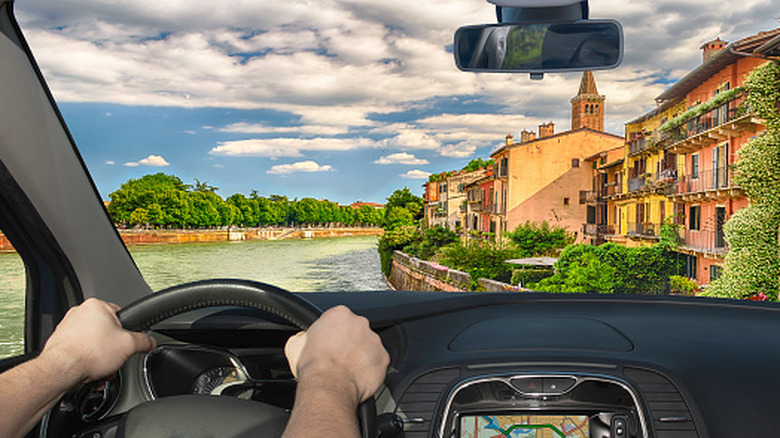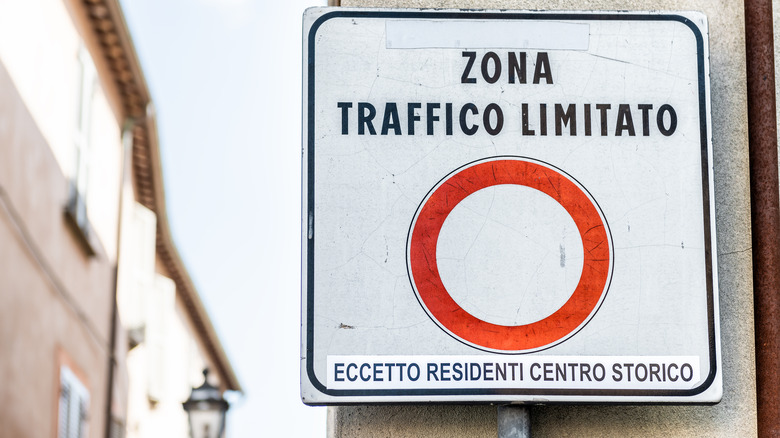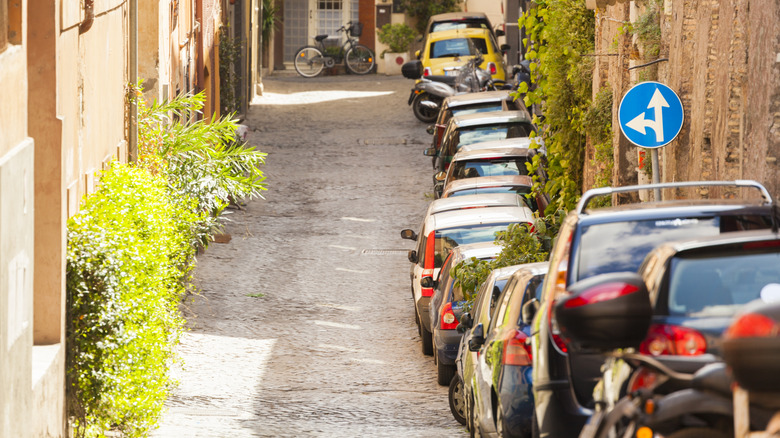Tourists Driving In Italy Should Be Aware Of This Traffic Rule To Avoid Paying Hefty Fines
If you're visiting Italy and you want to savor its beautiful destinations at your own pace, renting a car is often the best bet. By driving yourself, you have the flexibility of choosing where to go and when to leave. But then, there's one specific traffic rule you absolutely can't afford to overlook: Never drive unauthorized through a Zona a Traffico Limitato (ZTL). You're perhaps wondering what a ZTL is. Well, it's otherwise known as "Limited Traffic Zone," the purpose of which is to restrict or limit vehicle movement and reduce pollution in historic or cultural city centers between the hours of 6:30 a.m. and 6:00 p.m.
Unless you're a resident, you have a local permit, or you're driving an authorized vehicle (like emergency vehicles), entering a ZTL can result in fines ranging from $95 to over $350, depending on the city and the severity of the infraction. What's unpleasantly funny about this is that you might even incur this fine without realizing it. A few weeks after returning home, it could just sneak in as a nasty surprise as a ticket sitting in your mailbox. You should note that ZTLs are common in major Italian cities like Rome, Florence, Milan, and Bologna. In Rome, for instance, the ZTL includes touristy areas near the Pantheon, Piazza Navona, and Campo de' Fiori. And in Florence, unapproved vehicles have to steer clear of areas around the Duomo, Piazza della Signoria, and Piazza San Marco.
Recognizing ZTLs and how they work
One thing you must know is that sometimes these Limited Traffic Zones are not well marked. GPS navigation systems may also disappoint. And rental companies? They generally don't tell tourists about ZTLs, either. This is why you should be extra alert regarding car rentals in Italy and do your homework diligently. Note that while ZTLs in Italy typically pertain to the hours from 6:30 a.m. until 6:00 p.m., some cities like Rome that have a bustling night life implement nighttime zones (ZTL Notturna), which could last till 3 a.m. So make sure to investigate these details before your trip.
To save yourself a load of stress, one helpful thing to consider is learning how to read Italian traffic signs. ZTLs are usually marked by signs that say Zona a Traffico Limitato, accompanied by a red circle and the time of enforcement. On the top of the sign, there's often an electronic display of either the words "Varco Attivo" (meaning access is restricted) or "Varco Non Attivo" (meaning access is allowed). If you see "Varco Attivo," you should know immediately that the ZTL is active and you simply have to stay off that road. Note that these ZTL areas usually have automated cameras looking out for defaulters, and the authorities issue tickets with fines based on the license plates, which then get forwarded to the rental company. This company, in turn, will forward the ticket to you at the address you provide when you fill out the rental agreement.
Getting around the ZTL restrictions in Italy
There are several travel hacks that come in handy when visiting Italy, and being able to save yourself from ZTL fines is one you shouldn't take for granted. Since ZTLs are most common in city centers, why not just avoid driving in these places altogether? Instead, park in designated lots or garages outside the city core, and use public transportation (these taxi navigation tips will come in handy). Better yet, since many Italian tourist hotspots are walkable, you could simply forgo your car and explore on your own two feet. This will give you an even more immersive and authentic experience of the destination.
When you have to drive, apps like MAT:ZTL and Waze may be helpful. And if you must drive into a ZTL — for example, to get to your hotel — you should contact the hotel in advance. If your hotel is located within a ZTL, they might be able to arrange temporary access for check-in or parking purposes. But always double-check that your hotel has successfully registered your vehicle before you enter the ZTL. And remember that this authorization will only last till the end of your stay and may only apply to the specific ZTL where your hotel is located. Should you ever receive a ZTL fine in the mail, don't ignore it. These Italian traffic fines are enforceable internationally.


